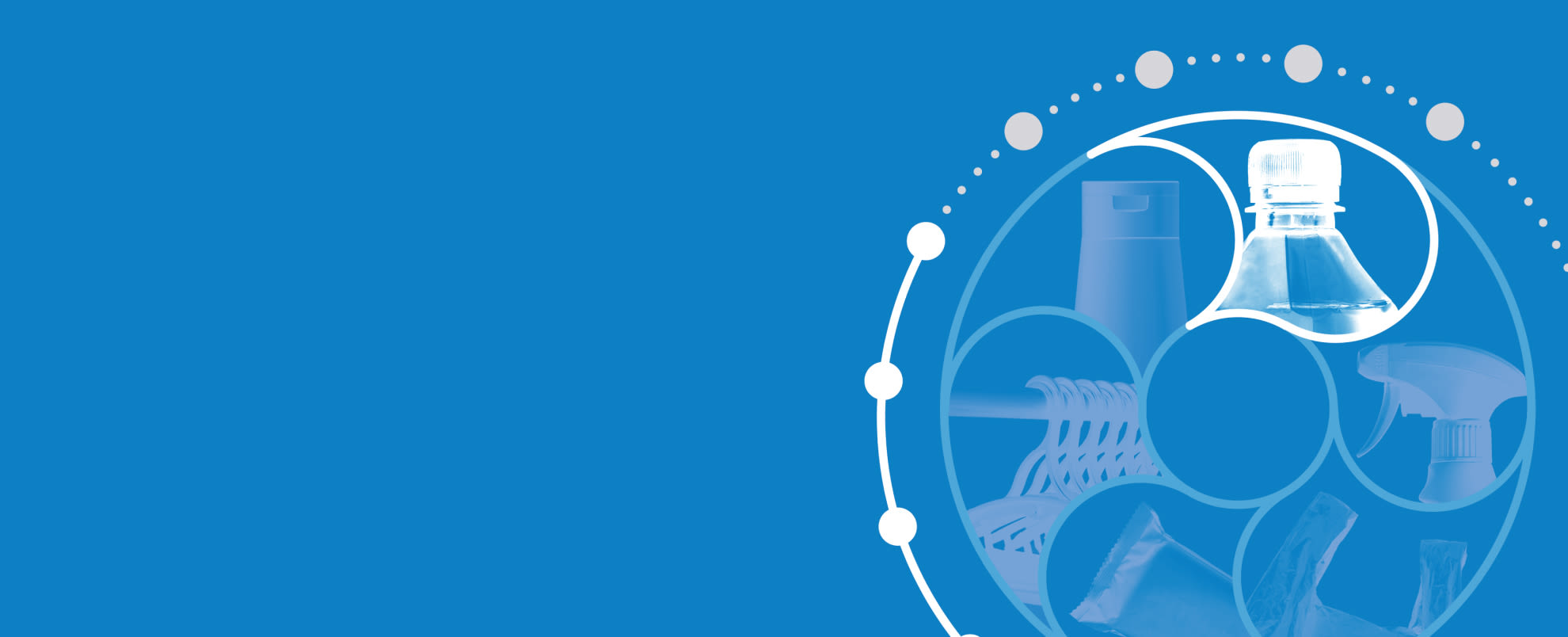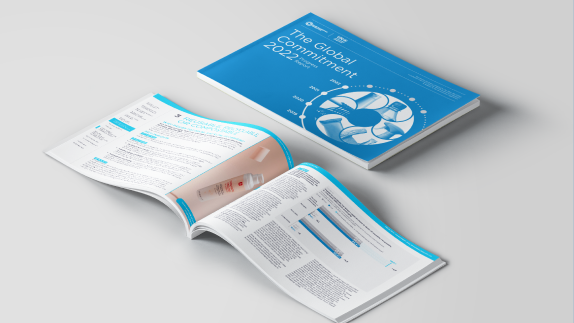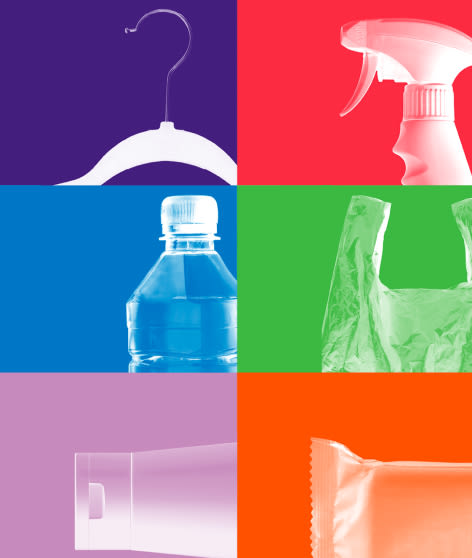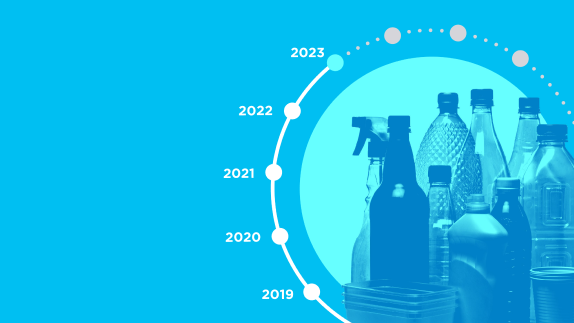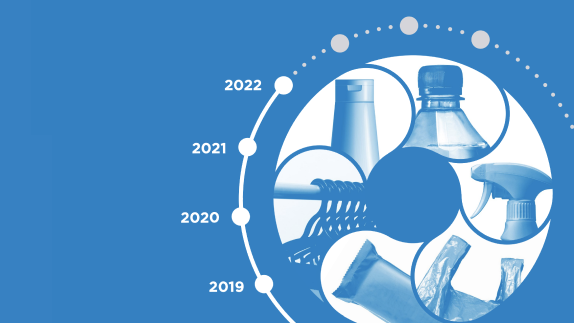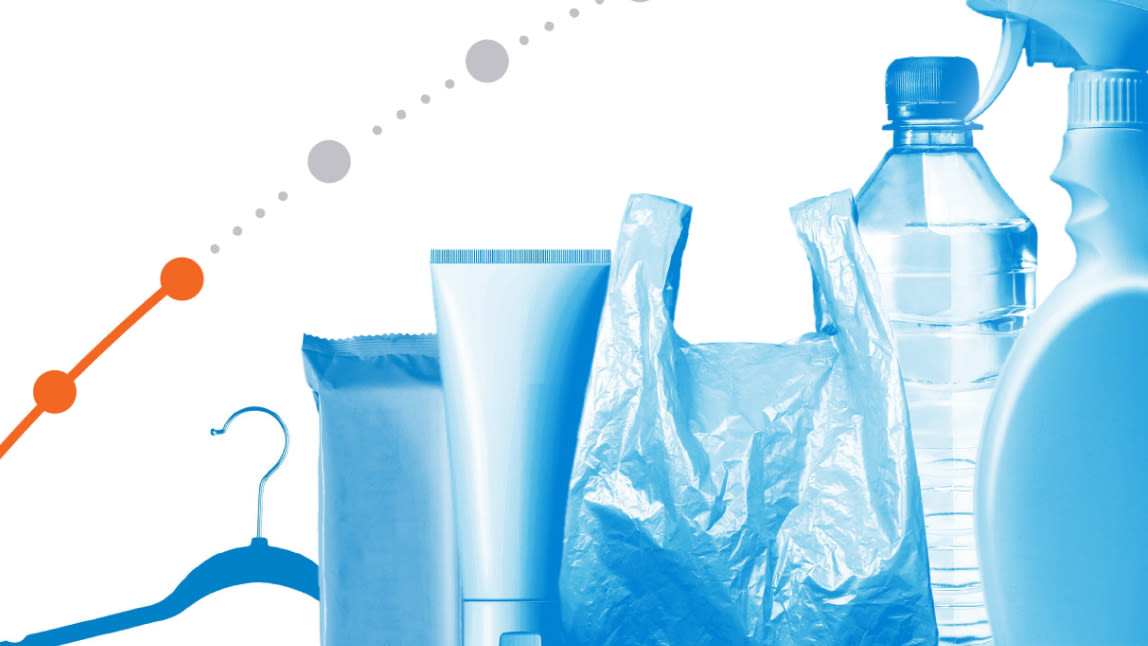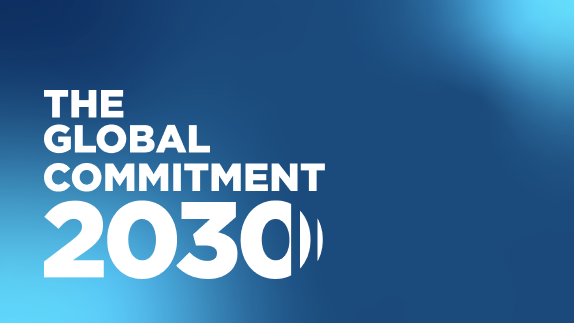Published as part of the Global Commitment Progress Report 2022 by the Ellen MacArthur Foundation and UN Environment Programme
Overall trends
Virgin plastic packaging decreased by 1.4% from 2020 to 2021, driven by five (63%) beverage signatories. This decrease was mostly driven by a growth in post-consumer recycled (PCR) content, with three signatories also reporting a decrease in plastic packaging. However, in comparison to 2018, most beverage signatories (63%) increased their virgin plastic packaging. This was driven by a strong increase in plastic packaging, by 6% on average in the sector from 2018 to 2021, that was not offset by a sufficient growth in PCR content. This growth in total plastic packaging surpassed the average growth for brands and retailers during this period (+4%).
The majority of beverage signatories (86%) have not increased their share of reusable plastic packaging. However, two signatories announced time-bound reuse targets. Despite signatories expanding pilots for reusable glass and PET bottles, and two signatories announcing reusereuseThe repeated use of a product or component for its intended purpose without significant modification. targets, most did not increase their share of reusable plastic packaging. More than half of signatories do not have any reusable plastic packaging at all, and elimination efforts have focused on lightweighting rather than reuse.
Actions to accelerate progress
A significant emphasis should be placed on total plastic packaging reduction and the decoupling of business growth from plastic packaging use. Given the strong increase in the use of plastic packaging – which will pose challenges for beverage signatories to achieve their virgin or total reduction target – signatories should focus on reducing their total plastic packaging use along with accelerating their use of PCR content.
All companies are encouraged to implement a reuse strategy with quantitative targets. It is essential that all reuse strategies extend beyond pilots to include credible action plans that can lead to reuse models – such as returnable PET bottles – being deployed at scale, to reduce the total weight and number of packaging units put on the market. Beverage companies are encouraged to work together to share learnings and facilitate the development of an integrated reuse approach, for example through shared distribution and cleaning infrastructure in addition to the standardisation of reusable beverage bottles.
Reduction targets
Average change in virgin plastic packaging from 2020 to 2021: -1.4%
In 2021, signatories have set 2025 targets to reduce their virgin plastic packaging (i) or total plastic packaging (ii) as part of the mandatory requirements to remain in the Global Commitment.
Trends
In 2021, six out of the eight beverage signatories set a virgin reduction target, averaging 16%. Two set targets to reduce the total weight of their plastic packaging.
Between 2020 and 2021, the group collectively decreased their virgin plastic packaging by an average of -1.4%, with five signatories reporting a decrease. Three signatories reported an increase, largely due to the growth in total plastic packaging use outpacing progress on recycled content.
Looking at the overall trend from 2018 to 2021, the sector decreased its virgin plastic packaging by an average of -2%, however this was driven by only three signatories (38%).
Virgin reduction targets aim to decrease the total weight of virgin plastic in packaging, and should be underpinned by reuse and elimination efforts, in addition to increasing the use of recycled content.
Total reduction targets aim to reduce the total weight of plastic packaging.
For more information about the reduction targets read the 2022 Progress Report.
Elimination of problematic or unnecessary plastic packaging
Trends
Beverage signatories are most commonly eliminating labels/sleeves and B2B films, as well as packaging that are commonly not recyclable such as PS, metallised films, multilayer materials, and undetectable carbon black.
The vast majority (75%) of elimination examples reported involved material changes, such as substitution to paper or other materials, lightweighting, and removal of a pigment. However, only three signatories (38%) reported fundamental changes to their packaging, products, or business models, such as direct elimination or the implementation of reuse models, which would reduce the need for single-use packaging in the first place.
Highlights
Arca Continental has eliminated film used in small water jugs in Peru, and is currently removing pigments from PET bottles used under its Sprite brand and optimising pallet design to utilise the least amount of stretch wrap possible.
Molson Coors Brewing Company has eliminated plastic rings on all major UK brands of can multipacks, by replacing them with recyclable cardboard sleeves, and is planning to do the same for its US brands. The company is also planning to eliminate multilayer materials and printed shrink wrap by 2025.
Pernod Ricard is planning to fully eliminate multilayer materials, PS, pigments used in PET bottles, and mini PET bottles by 2025.
Moving from single-use towards reuse models
Reusable plastic packaging in 2021: 3% (▼0.1pp vs 2020)
Trends
Almost all signatories (88%) had reuse models and/or pilots in place in 2021. Half were selling products through ‘return-on-the-go’ models, for example in returnable glass or plastic bottles. More reuse pilots were launched in 2021 (12) compared to 2020 (5), although by a minority of the group – three out of the eight signatories.
Two signatories (The Coca-Cola Company and PepsiCo) have committed to time-bound reuse targets. However, in total six signatories (86%) reported either no change or a decrease in their share of reusable plastic packaging and more than half (57%) of beverage signatories reported that 0% of their plastic packaging was reusable.
Highlights
Alongside expanding their Universal Bottle initiative to more product lines across markets, Arca Continental plans to increase customer engagement with its reuse models through membership to return the bottles and availability of promotional codes via digital platforms.
Alpla developed reusable PET bottles for fresh juice and milk, using a washing and sanitising process that can remove stains of proteins and fat. This is expected to have higher rotations than glass bottles.
The Coca-Cola Company set a goal to have 25% of their global beverages sales to be through refillable or returnable packaging by 2030, and PepsiCo plans to announce a target at the end of 2022.
100% of plastics packaging reusable, recyclable, or compostable (RRC)
RRC in 2021: 75%(▲2.1pp vs 2020) | 2025 target: 100%
Trends
The average proportion of reusable, recyclable, or compostable plastic packaging increased by 2 percentage points in 2021, driven by an increase in recyclabilityrecyclabilityThe ease with which a material can be recycled in practice and at scale. compared to reusability or compostability. Six signatories increased their share of recyclable plastic packaging while two reported a decrease.
Signatories reported investing in the infrastructure to increase recycling rates for all plastic packaging, including those that are recyclable in practice and at scale (e.g. PET bottles) and those that are not (e.g. PP pots, tubs, and trays). Several signatories also removed labels and pigments to improve recyclability of their bottles and/or eliminated other non-recyclable materials such as sachets.
Highlights
Diageo increased its recyclability from 67% in 2020 to 72% in 2021 by discontinuing single-use plastics in certain markets and eliminating non-recyclable plastics in favour of recyclable ones. The company notably reported the elimination of 3,690 metric tonnes of sachets.
The Coca-Cola Company and its bottlers have removed pigments and labels from some of their bottles to improve recyclability.
Several businesses reported either working with external stakeholders to develop shared recycling infrastructure or investing in their own. For example, Arca Continental invested 11 billion Mexican pesos in Petstar’s collection centres to increase the volume of recycled plastic.
Post-consumer recycled content (PCR) targets
PCR in 2021: 13% (▲3pp vs 2020) | 2025 target: 28%
Trends
Seven signatories (88%) increased their proportion of recycled content, while one decreased this amount. Two signatories, Keurig Dr Pepper and Spadel, increased it by around 9 percentage points. Compared to other sectors, however, the beverage sector continues to have one of the lowest amounts of PCR content.
Signatories focused on incorporating recycled content in their PET bottles, which currently represents on average 73%of the sector’s plastic packaging portfolio, with a few reporting examples of collaborating with external stakeholders and investing in recycling facilities to secure the supply of food-grade recycled content and recycled polypropylene.
Highlights
Spadel and Keurig Dr Pepper reported the strongest growth in PCR content in the sector (by 9.1 and 9 percentage points respectively), gained by switching multiple product lines to 100% rPET. Keurig Dr Pepper is also working with other initiatives such as The Recycling Partnership to secure the supply of recycled plastic materials such as polypropylene.
To secure food-grade recycled content, Swire Coca-Cola invested in New Life Plastics (NLP) – the first food-grade PET recycling facility in Hong Kong operational from mid-2022. Meanwhile, Coca-Cola FEMSA expanded its investment in food-grade PET recycling facilities in Latin America, with PLANETA (Planta Nueva Ecología de Tabasco) in México, which will be operational in 2023.
Beverages sector compared to other sectors
Endnotes
General note: Some quantitative metrics for 2020 might differ from those reported in the sector insights published in 2021 as some companies updated prior years’ metrics due to improvement in methodology, merger and acquisition or scope expansion.
The change in virgin plastic packaging represents the non-weighted change reported by all signatories in the sector.
For signatories where data on key metrics was lacking for 2018 on virgin plastic packaging, data was extrapolated based on the metrics’ average for the group.
PS = Polystyrene.
As a packaging producer, Arca Continental’s data is not included in the progress on the quantitative metrics
The quantitative metrics for 2020 and 2025 targets represent the non-weighted average of the data reported by all signatories in the sector.
As a packaging producer, Alpla's data is not included in the progress on the quantitative metrics.
Reuse target set by The Coca-Cola Company differs from how reusable plastic packaging is counted in the Global Commitment, as the former focuses on the percentage of volume delivered through reuse models and the latter on the proportion of plastic packaging that is reusable.
To be claimed as recyclable/compostable according to the Global Commitment definition of recyclable/compostable ‘in practice and at scale’, packaging needs to meet the thresholds of being recycled/composted at a 30% rate across multiple regions, collectively representing at least 400 million inhabitants. For more information, see ‘How are recyclability and compostability assessed in the Global Commitment?’ in the 2022 Progress Report.
In this document, the quantitative metrics for 2020 and 2025 targets represent the non-weighted average of the data reported by all signatories in the sector. The year-on-year changes reported across all metrics refer to those seen for signatories reporting in both of the last two years (i.e. data from signatories reporting for the first time in 2021 are not included as part of the change).
Ibid.
HDPE = High-density polyethylene; PE = Polyethylene; PET = Polyethylene terephthalate; PP = Polypropylene.
The 2025 target reported is for sector signatories with virgin plastic packaging reduction target, and as such excludes signatories with a total reduction target”
Disclaimer
This report has been produced by the Ellen MacArthur Foundation (the “Foundation”). The Foundation has exercised care and diligence in preparing this report, based on information it believes to be reliable, but makes no representations and gives no warranties, assurances or undertakings (express or implied) in connection with it or any of its content (as to its accuracy, completeness, quality, fitness for any purpose, compliance with law, or otherwise).
The Foundation does not monitor or moderate any external websites or resources linked or referred to in this report. This report does not purport to be comprehensive and none of its contents shall be construed as advice of any kind. Any reliance on it is at reader’s own discretion and risk.
All information on signatories’ progress in this report has been provided by the relevant signatories and has not been audited or verified by the Foundation or UN Environment Programme (UNEP). Each signatory is responsible for the information it submitted.
The Foundation and UNEP do not warrant that all information submitted by individual signatories is contained or represented in this report and, without limiting the generality of the foregoing, the Foundation may: (i) have excluded data which it believes to be inaccurate; (ii) have excluded from year-on-year calculations data from signatories which have not reported data in both years; and (iii) have normalised information to produce the aggregated and averaged statistics featured in this report. Further, if a signatory has not reported by the relevant deadline(s), its data will not be included in this report. If you are a signatory and you believe there has been an error in the reproduction of the information provided to us by your organisation, please contact us as soon as possible at reportingGC@ellenmacarthurfoundation.org, or your contact at UNEP.
To the maximum extent permitted by any applicable law, the Foundation, each entity within its group and each of its associated charities and their respective employees, workers, officers, agents and representatives disclaim in full all liability for any loss or damage of any kind (whether direct or indirect and whether under contract, tort, breach of statutory duty or otherwise) arising under or in connection with this report or any of its contents.
Contributions to this report by any third party do not indicate any partnership or agency relationship between that contributor and the Foundation, nor the endorsement by the Foundation of that contributor or the endorsement by that contributor of this report’s conclusions and recommendations.
The Foundation is not a supplier of, or otherwise affiliated with, and does not recommend or endorse, any third party or the products or services referred to in this report.
About these sector insights
This document presents insights and data on the progress made by beverage signatories listed below to achieve their commitments on plastic packaging. This document is part of the 2022 Global Commitment Progress Report.
About the Global Commitment
The Global Commitment is an initiative led by the Ellen MacArthur Foundation, in collaboration with the UN Environment Programme. Through the Global Commitment, businesses and governments commit to change how we produce, use, and reuse plastic. They will work to eliminate the plastic items we don’t need; innovate so all plastic we do need is designed to be safely reused, recycled, or composted; and circulate everything we use to keep it in the economy and out of the environment. Learn more
Global Commitment signatories reporting in this sector
The Coca-Cola Company
Diageo
innocent drinks
Keurig Dr Pepper
Molson Coors Brewing Company
PepsiCo*
Pernod Ricard
Spadel
